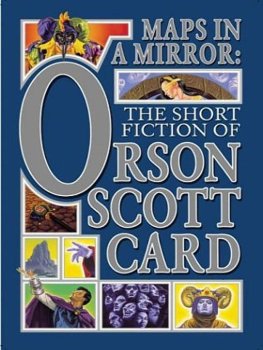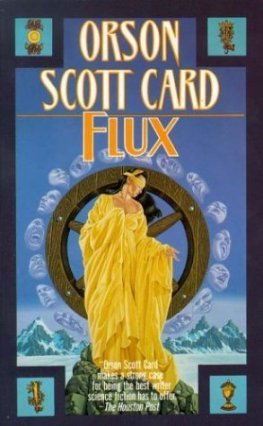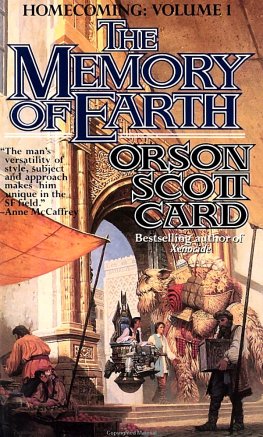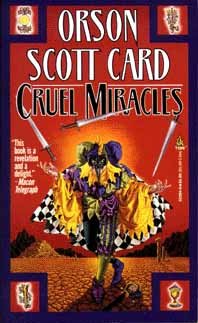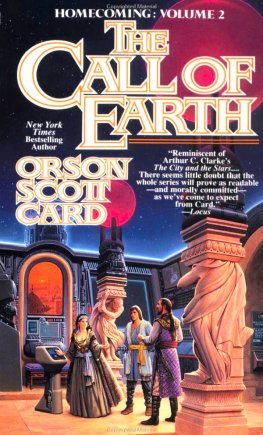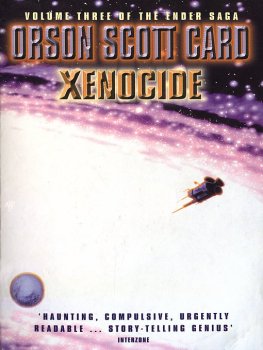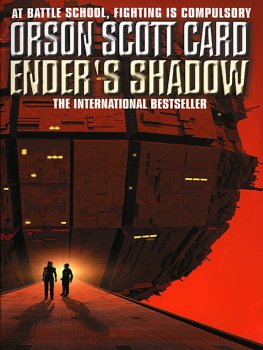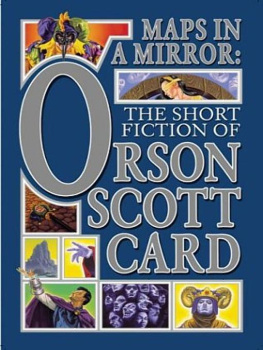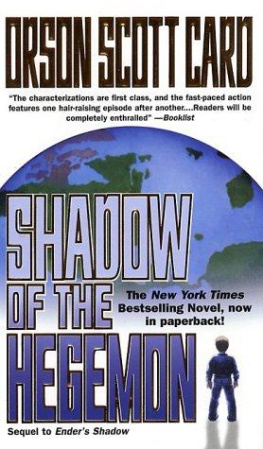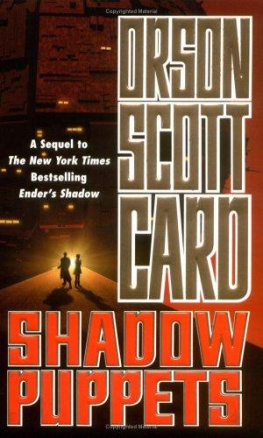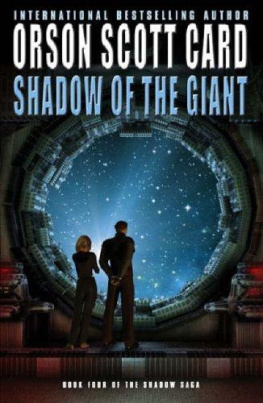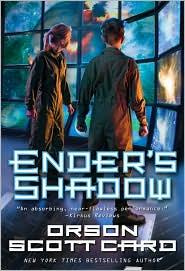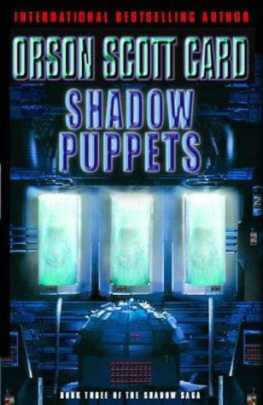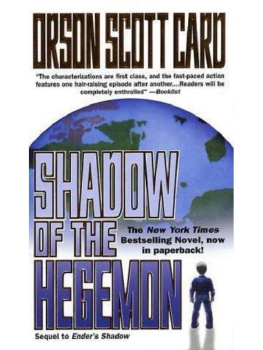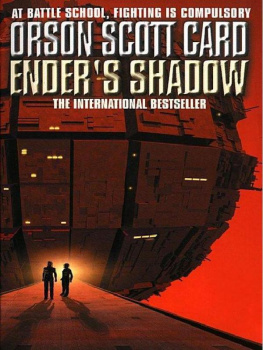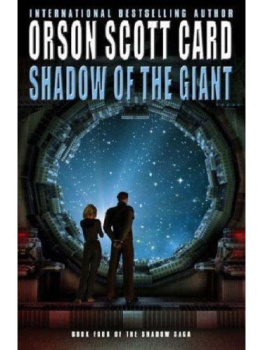Orson Card - Shadow of the Giant
Here you can read online Orson Card - Shadow of the Giant full text of the book (entire story) in english for free. Download pdf and epub, get meaning, cover and reviews about this ebook. genre: Science fiction. Description of the work, (preface) as well as reviews are available. Best literature library LitArk.com created for fans of good reading and offers a wide selection of genres:
Romance novel
Science fiction
Adventure
Detective
Science
History
Home and family
Prose
Art
Politics
Computer
Non-fiction
Religion
Business
Children
Humor
Choose a favorite category and find really read worthwhile books. Enjoy immersion in the world of imagination, feel the emotions of the characters or learn something new for yourself, make an fascinating discovery.

- Book:Shadow of the Giant
- Author:
- Genre:
- Rating:3 / 5
- Favourites:Add to favourites
- Your mark:
- 60
- 1
- 2
- 3
- 4
- 5
Shadow of the Giant: summary, description and annotation
We offer to read an annotation, description, summary or preface (depends on what the author of the book "Shadow of the Giant" wrote himself). If you haven't found the necessary information about the book — write in the comments, we will try to find it.
Shadow of the Giant — read online for free the complete book (whole text) full work
Below is the text of the book, divided by pages. System saving the place of the last page read, allows you to conveniently read the book "Shadow of the Giant" online for free, without having to search again every time where you left off. Put a bookmark, and you can go to the page where you finished reading at any time.
Font size:
Interval:
Bookmark:
Card, Orson Scott
Shadow of the Giant
1
MANDATE OF HEAVEN
From: Graff%pilgrimage@colmin.gov
To: Soup%battleboys@strategyandplanning.han.gov
Re: Free Vacation Offer
Destination of your choice in the known universe. And we pick you up!
Han Tzu waited until the armored car was completely out of sight before he ventured out into the bicycle-and-pedestrian-packed street. Crowds could make you invisible, but only if you were moving in the same direction, and that's the thing Han Tzu had never really been able to do, not since he came home to China from Battle School.
He always seemed to be moving, not upstream, but crossways. As if he had a completely different map of the world from the one everyone around him was using.
And here he was again, dodging bikes and forward-pressing people on their ten thousand errands in order to get from the doorway of his apartment building to the door of the tiny restaurant across the street.
But it was not us hard as it would have been for most people. Han Tzu had mastered the art of using only his peripheral vision, so his eyes stared straight ahead. Without eye contact, the others on the street could not face him down, could not insist that he yield the right of way. They could only dodge him, as if he were a boulder in the stream.
He put his hand to the door and hesitated. He did not know why he had not been arrested and killed or sent for retraining already, but if he was photographed taking this meeting, then it would be easy to prove that he was a traitor.
Then again, his enemies didn't need evidence to convictall they needed was the inclination. So he opened the door, listened to the tinkle of the little bell, and walked toward the back of the narrow corridor between booths.
He knew he shouldn't expect Graff himself. For the Minister of Colonization to come to Earth would be news, and Graff avoided news unless it was useful to him, which this would certainly not be. So whom would Graff send? Someone from Battle School, undoubtedly. A teacher? Another student? Someone from Ender's Jeesh? Would this be a reunion?
To his surprise, the man in the last booth sat with his back toward the door, so all Han Tzu could see was his curly steel-grey hair. Not Chinese. And from the color of his ears, not European. The pertinent fact, though, was that he was not facing the door and could not see Han Tzu's approach. However, once Han Tzu sat down, he would be facing the door, able to observe the whole room.
That was the smart way to do itafter all, Han Tzu was the one who would recognize trouble if it came in the door, not this foreigner, this stranger. But few operatives on a mission this dangerous would have the brass to turn their backs on the door just because the person they were meeting would be a better observer.
The man did not turn as Han Tzu approached. Was he unobservant, or supremely confident?
"Hello," the man said softly just as Han Tzu came up beside him. "Please sit down."
Han Tzu slid into the booth opposite him and knew that he knew this old man but could not name him.
"Please don't say my name," said the man softly.
"Easy," said Han Tzu. "I don't remember it."
"Oh, yes you do," said the man. "You just don't remember my face. You haven't seen me very often. But the leader of the Jeesh spent a lot of time with me."
Now Han Tzu remembered. Those last weeks in Command School on Eros, when they thought they were in training but were really leading far-off fleets in the endgame of the war against the Hive Queens. Ender, their commander, had been kept separate from them, but they learned afterward that an old half-Maori cargo-ship captain had been working closely with him. Training him. Goading him. Pretending to be his opponent in simulated games.
Mazer Rackham. The hero who saved the human race from certain destruction in the Second Invasion. Everyone thought he died in the war, but he had been sent out on a meaningless voyage at near-lightspeed, so that relativistic effects would keep him alive so he'd be there for the last battles of the war.
He was ancient history twice over. That time on Eros as a part of Ender's Jeesh seemed like another lifetime. And Mazer Rackham had been the most famous man in the world for decades before that.
Most famous man in the world, but almost nobody knew his face.
"Everyone knows you piloted the first colony ship," said Han Tzu.
"We lied," said Mazer Rackham.
Han Tzu accepted that and waited in silence.
"There is a place for you as head of a colony," said Rackham. "A former Hive world, with mostly Han Chinese colonists and many interesting challenges for a leader. The ship leaves as soon as you board it."
That was the offer. The dream. To be out of the turmoil of Earth, the devastation of China. Instead of waiting to be executed by the angry and feeble Chinese government, instead of watching the Chinese people writhe under the heel of the Muslim conquerors, he could board a beautiful clean starship and let them fling him out into space, to a world where human feet had never stepped, to be the founding leader of a colony that would hold his name in reverence forever. He would marry, have children, and, in all likelihood, be happy.
"How long do I have to decide?" asked Han Tzu.
Rackham glanced at his watch, then looked back at him without answering.
"Not a very long window of opportunity," said Han Tzu.
Rackham shook his head.
"It's a very attractive offer," said Han Tzu.
Rackham nodded.
"But I wasn't born for such happiness," said Han Tzu. "The present government of China has lost the mandate of heaven. If I live through the transition, I might be useful to the new government."
"And that's what you were born for?" asked Rackham.
"They tested me," said Han Tzu, "and I'm a child of war."
Rackham nodded. Then he reached inside his jacket and took out a pen and laid it on the table.
"What's that?" asked Han Tzu.
"The mandate of heaven," said Rackham.
Han Tzu knew then that the pen was a weapon. Because the mandate of heaven was always bestowed in blood and war.
"The items in the cap are extremely delicate," said Rackham. "Practice with round toothpicks."
Then he got up and walked out the back door of the restaurant.
No doubt there was some kind of transport waiting there.
Han Tzu wanted to leap to his feet and run after him so he could be taken out into space and set free of all that lay ahead.
Instead he put his hand over the pen and slid it across the table, then put it into the pocket of his trousers. It was a weapon. Which meant Graff and Rackham expected him to need a personal weapon soon. How soon?
Han Tzu took six toothpicks out of the little dispenser that stood on the table against the wall, beside the soy sauce. Then he got up and went to the toilet.
He pulled the cap off the pen very carefully, so he didn't spill out the four feather-ended poison darts bunched in it. Then he unscrewed the top of the pen. There were four holes there, besides the central shaft that held the tube of ink. The mechanism was cleverly designed to rotate automatically with each discharge. A blow-gun revolver.
He loaded four toothpicks into the four slots. They fit loosely. Then he screwed the pen back together.
The fountain pen writing tip covered the hole where the darts would emerge. When he held the top of the pen in his mouth, the point of the writing tip served as the sighting device. Point and shoot.
Point and blow.
He blew.
The toothpick hit the back wall of the bathroom more or less where he was aiming, only a foot lower. Definitely a close-range weapon.
He used up the rest of the toothpicks learning how high to aim in order to hit a target six feet away. The room wasn't large enough for him to practice aiming at anything farther. Then he gathered up the toothpicks, threw them away, and carefully loaded the pen with the real darts, handling them only by the feathered part of the shaft.
Font size:
Interval:
Bookmark:
Similar books «Shadow of the Giant»
Look at similar books to Shadow of the Giant. We have selected literature similar in name and meaning in the hope of providing readers with more options to find new, interesting, not yet read works.
Discussion, reviews of the book Shadow of the Giant and just readers' own opinions. Leave your comments, write what you think about the work, its meaning or the main characters. Specify what exactly you liked and what you didn't like, and why you think so.

